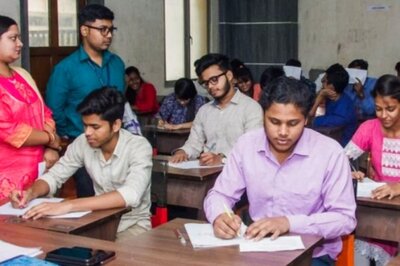
views
The word Harikathe invokes laughter in many. It is a term locals use to describe a boring sermon by an elderly person or teacher. The word is casually thrown about with little knowledge about its value. The forgotten art of Harikathe is in its last stage of existence and all we know about it is — well nothing! One of Karnataka’s oldest traditions, Harikathe simply put is Lord Vishnu’s story. ‘Hari’ means Lord Vishnu and ‘Kathe’ means story in Kannada.It is an art form that incorporates music, dance, drama and theatre seamlessly, wrapping a philosophy in the process so as to entertain the audience and educate them about life at the same time.The most important element of the Harikathe is the philosophical and spiritual aspect that is interwoven with the other elements. Harikathe is incomplete without an ideology or philosophy attached to it.In the olden days Harikathe was all about singing Lord Vishnu’s praises. Vaishnavites (worshippers of Vishnu) gave life to the art form. In fact the first Harikathe exponent is said to be sage Narada who travelled around spreading his wisdom. Infact, his name in Sanskrit means giver of wisdom.He gave wisdom in a unique way with Harikathe. However, for humans on earth, Harikathe was strictly for enlightened souls — the Rishis. Mostly poems from the Bhagavatam (a religious text of Hindus that glorifies incarnations of Vishnu, particularly Krishna) were reflected in the Harikathes.The truth, which ordinary souls could not find or even understand, was made available by Rishis through this art form. High-level philosophies were packaged in simple language and presented as entertainment. All this so that people could lead a better life. Indeed a novel way of servicing mankind.Hard-core Harikathe exponents commanded the greatest respect in society, kings bowed down to their knowledge and they were next only to God. Over the passage of time and keeping with the ideology of taking Harikathe to the masses, Harikathe was tweaked according to the community it was catering to.This meant involving folk stories and day-to-day life’s philosophies in the same dance-drama-theatre format. Harikathe is a one-man show and a Harikathe expert must have undergone years of training before he/she is ready to go on stage and perform for an audience.In the olden days it was a prerequisite to have a spiritual bent of mind in order to learn the art. Having one’s own philosophy was a must. Apart from being well-versed in the Puranas (religious texts) one must be an excellent orator and have the charisma to attract an audience.One must be an ace storyteller, musicologist, dancer; and have the ability to bring an element of drama into their storytelling. A taxing task which is why there are very few takers for the art form today.The once popular art of Harikathe has lost its attraction. Performers of the art are very few and far between and connoisseurs, even less.A Harikathe exponent and the director of well-known dance-drama and theatre group Prabhath Kalavidaru, Raghavendra Prabhath, comes from one the very few families that boasts of having Harikathe as a family tradition. Their family follows Madhvacharya’s style of telling Harikathes.Madhvacharya’s philosophy was carried forward by eight saints who set up universities all over Asia to teach Harikathe and other art forms and philosophies. The Prabhath family tree originates from Sri Vyasa Raja who was taught in one of the universities.The other family in Karnataka famous for their contribution belongs to that of Badragiri Achyutha Das and Keshav Das who exposed Harikathe to an international audience in America and the UK. Badragiri Achyutha Das has also performed Harikathes in English. In the same league is Gururajanna Naidu whose daughters perform Harikathes even to this day. “Harikathe is not for everyone, it is god’s gift,” says Raghavendra Prabhath."To be true to the art form one must study society and be aware of contemporary issues. One needs to grow spiritually every day and should carry forward the heritage,” he adds.“Harikathe was a movement and our forefathers have contributed to its current existence,” he says talking about his father Jayasimha Das, who along with his brother Gopinath Das, under the leadership of their uncle T K Venugopala, started Prabhath.Prabhath Kalavidaru celebrated the twenty fifth death anniversary of Jayasimha Das on July 31, a Harikathe exponent who was a multifarious personality with his fingers in many pies.He was an accomplished actor, lyricist, director, educationist apart from being the rock star of Harikathe. He was acknowledged by the government of Karnataka who honoured him with the Rajyotsava Award in 1985 and the Karnataka Sangeetha Nruthya Academy Award in 1986.The commemoration saw family, friends, fans and well-wishers flock to Ravindra Kalakshethra to pay tribute to his contribution to the art form of Harikathe. It was the acknowledgment of the effect he must have had on their lives. The event began with Pejavar Mutt seer Vishvesha Teertha talking about the immense contribution of Jayasimha Das to Karnataka’s culture. This was followed by performances from the Prabhath troupe that included Lava-Kusha, a drama, Rukmini Kalyana, a dance drama and Krishna Vyjayanthi, a dance, all composed by Jayasimha Das. The highlight of the show was the enthralling Harikathe on Bharatha Bandhu Prema, on the brotherhood between King Bharatha and Rama, performed by Jayasimha Das’s grand son Sharath Prabhath (Sharath Das Acharya) who is just 20 years old.The finale was the energetic yet graceful Mahadeva dance, a Shiv Thandava by Jayasimha Das’ grandsons Sharath and Bharath Prabhath. The event ended with the book launch of Simhavalokana, on the life of Jaysimha Das and the audio release of some if his famous works. The event was graced by veteran freedom fighter H S Doreswamy, cine artistes Srinath and CR Simha and religious philosopher Dr Aralu Mallige Parthasarathy.“There are very few people in the state that perform Harikathes. In order to promote the art people especially parents should not be against their culture. Our ignorance has done us harm. We must be proud of our culture not ashamed of it. Our culture is scientific, people need to re-discover it,” says Raghavendra Prabhath.“The government should provide financial support since the field is not lucrative. People in power are not concentrating on development of art and culture. They support only their communities. No one sees merit. Earlier, art forms survived because of the patronage of kings,” he says matter-of-factly. He is currently in the process of setting up a school that teaches Harikathe named Samudyatha.There is no formal education to teach Harikathes. The tradition is carried forward by families. Some parts of Karnataka have few performers but have no recognition. With few Harikathe performers, the threat to its existence is evident. The dying art of Harikathe may soon become the lost jewel in Karnataka’s cultural crown.


















Comments
0 comment